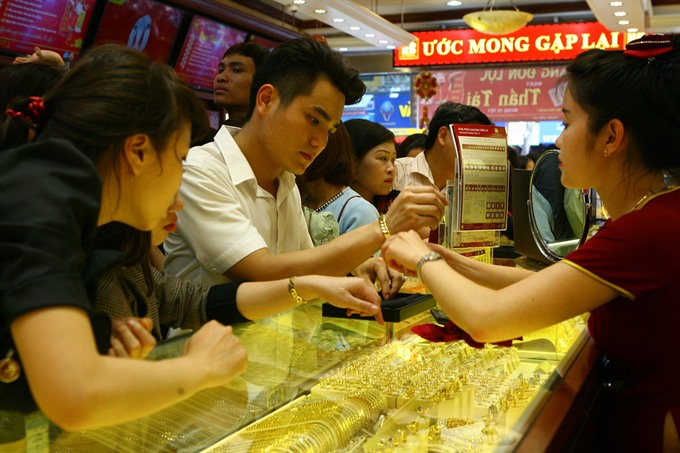Vietnam: Gov’t studies making use of idle dollars, gold
HANOI — How to mobilise idle foreign currency and gold from locals to invest in business and production has become a hot issue recently, with the Government last week once again asking the State Bank of Vietnam (SBV) to consider proposals.
At a working session with SBV last week, Government Office chairman Mai Tien Dung said the Prime Minister has asked SBV to study a more appropriate interest rate policy to encourage local US dollar holders to deposit the currency in banks, as the current interest rate of zero per cent discourages them to put money in credit institutions. At present, Vietnam still has to borrow dollars from international markets at 4 per cent interest, so there should be suitable policies to tap dollars at home, he noted.
It is the third time the Prime Minister has mentioned the issue.
Vietnam stopped the mobilisation of gold in 2011, and a similar move was applied for the dollar in 2015 when the zero per cent interest rate for dollar deposits came into effect. The policies have contributed to restricting dollarisation and goldenisation in the economy and avoiding chaos in the market, with locals not using the dollar and gold as means of payment.
However, with the application of the policies, for gold alone, it is estimated that there are currently some 500 tonnes held by the people, which would be very useful if converted into the Dong to invest in the economy.
A similar trend was also seen for the idle dollar source. SBV applied the zero per cent dollar deposit policy in December 2015, which has contributed to curbing dollarisation in the economy, controlling inflation and stabilising the macro economy. However, it has also prevented dollar holders from depositing the greenback in banks.
As a result, some experts felt it is time to get rid of the policy while the dollar/Dong exchange rate was relatively stable and inflation was low.
Tien Phong Bank director Nguyen Hung said it would be difficult to continue with the policy, especially with the US Federal Reserve increasing the interest rate. As the economy’s resources reach their limit, the benefits of adjusting interest rates higher to mobilise dollars to create new stimulus and generate a large source of capital for the banking system should be calculated, he added.
Echoing Hung, banking and finance expert Can Van Luc also proposed to adjust the interest rate upwards, since according to his analysis, that local demand for dollar loans was very large.
According to Luc, in the first half of 2017 alone, demand for foreign currency loans increased by some 5 per cent against 1.5-2 per cent in the same period of 2016. Commercial banks were borrowing dollars from abroad at an interest rate of 2.5 per cent per year. Mobilisation from the local people would be cheaper and not subject to several restrictions. This move would contribute to lowering both input and output interest rates while still avoiding a dollarisation situation, he said.
If the interest rate was maintained at zero per cent, keeping dollars at home or depositing them in banks was the same, but if the three-month term had low deposit rates, such as 0.25 per cent, then people would consider depositing dollars in banks. This would generate a relatively stable capital source for banks. If the term was more than one year, the medium and long term mobilisation structure of the banking system would be raised, the expert analysed.
Besides using banks as an indirect channel to mobilise dollars, Nguyen Van Thuan from HCM City Finance and Marketing University also proposed to use the stock market as a direct channel to attract the source.
However, he said, the Government should take more measures to make the stock market more transparent, with listed firms paying due heed to sustainable growth, to attract dollar and gold holders.
To mobilise gold, Luc proposed to issue gold free interest rate deposit certificates, which the holders could mortgage at banks for loans.
According to Luc, the measure was more flexible and would not increase goldenisation in the economy. He said other countries such as India had been successful in applying this measure; however, he noted that the application must be scrutinised and if it adopted, a suitable time must be chosen.
Tien Phong Bank’s Hung also affirmed that successful gold mobilisation to reinvest in business and production would be beneficial, but it should have an appropriate policy as gold is quite different from money.
Gold mobilisation is complicated and risky as its price depends on the global and domestic market, he said, adding careful scrutiny is required to make the mobilisation effective.
Experts also agreed that the most important thing was to keep the macro economy stable and create a favourable business environment, explaining that gold and dollar holders would automatically convert it into Dong when they found profitable opportunities in a stable macro economy. — VNS
Source: http://vietnamnews.vn/economy/380713/govt-studies-making-use-of-idle-dollars-gold.html#TOKYE856ieKuMzOt.99


 Thailand
Thailand




